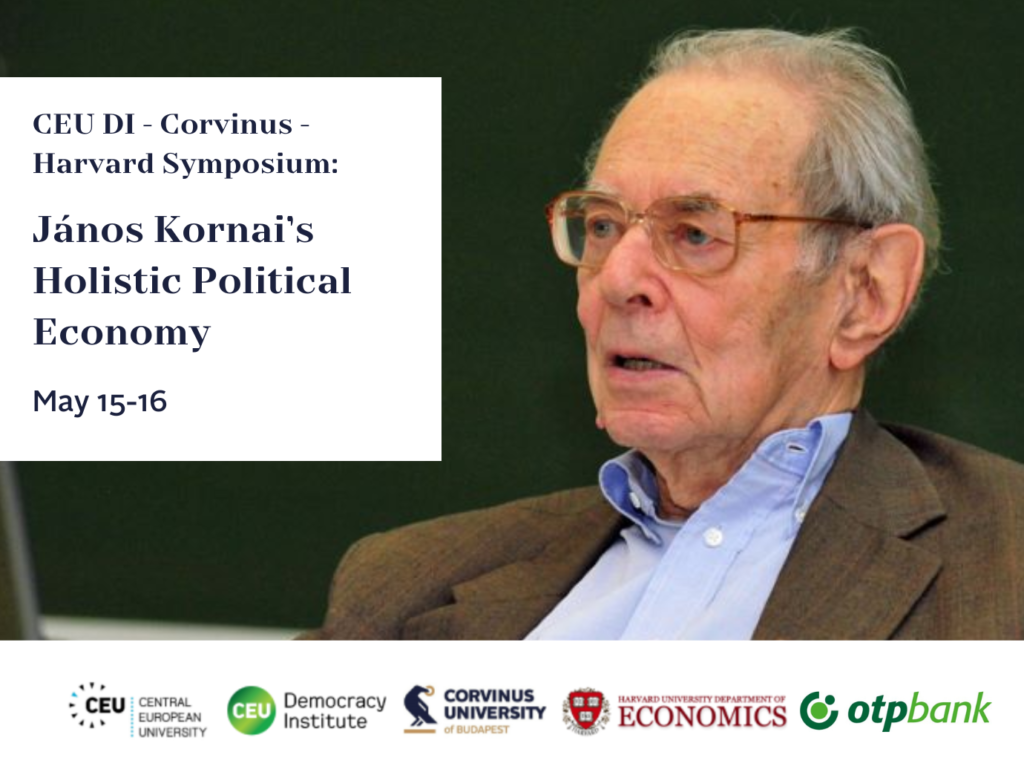International keynote speakers at the Kornai95 Economics Conference

More than thirty presentations will show how his life’s work can be applied to understanding today’s complex problems and finding solutions, from climate change to the role of the Internet and the background to Russian military spending.
A joint conference dedicated to the work of János Kornai will be organised next Monday and Tuesday in Budapest by three institutions with strong intellectual and emotional ties to the political economy giant: the Institute for Democracy at the Central European University (CEU DI), Corvinus University of Budapest and Harvard University. The symposium also aims to lay the foundations for a future János Kornai Research Institute by bringing together different generations of scholars influenced by the economist’s life’s work. The symposium will take place in a hybrid format – online and offline – on 15 May at Corvinus and on 16 May at CEU DI. The detailed programme and registration form are available here, on the Corvinus website.
Among the speakers will be Eric Maskin, winner of the 2007 shared Nobel Prize, Gerard Roland, Professor at the University of California, Berkeley, Chenggang Xu, China specialist at Stanford University, and Karen Eggleston, Professor of Health Economics at Stanford, among other distinguished Hungarian, Polish, Belgian, French and American researchers. On Monday, the conference will be welcomed by the Rector of Corvinus, Előd Takáts, and on Tuesday, László Bruszt, Co-Director of CEU DI.
The event will revisit some of the highlights of Kornai’s life’s work, to provide participants with methodological guidance on how to tackle the complex, real-world problems of today and continue Kornai’s intellectual legacy. The chances for China’s further rise, the explanation of the functioning of the European Recovery Fund (RRF), the common systemic features of post-socialist countries, the relational economy, and Kornai’s fellow reformer economists will be discussed. A number of papers deal with Kornai’s concept of the soft budget constraint and its extension to the international monetary system, banking, Russian military spending and sport, among others. The importance of the future-orientation of economics beyond GDP, Kornai’s influence on heterodox economics questioning profit as a desirable goal, and the interpretation of the Internet as one of Kornai’s coordination mechanisms will be focused on.
Challenges of global capitalism such as the ageing society, unpaid female domestic work, climate catastrophe and depleting natural resources, the justification for public investment in climate change mitigation derived from Kornai’s work and Kornai’s model of sustainability for today’s car market will be discussed. The impact of Kornai on contemporary moral economics, the impact of existentialism on Kornai, and the similarities between the holistic approaches of both János Kornai’s and Károly Polányi’s work will be discussed. Speaking scholars will also explore the proper role of professional managers and the state in health care, the contribution of economic development to the destruction of empires, the relationship between pension policy and inflation, and the rationality of private debt relief state programs.
János Kornai, who was born 95 years ago and died in 2021, was a prominent figure in political economy, an internationally renowned researcher of the socialist economic system, non-equilibrium systems and the post-socialist transition, and a Professor Emeritus at Harvard University and Corvinus University of Budapest. In 1980, he published one of his most famous works, The Deficit, in which he defied earlier theories to show that the deficit was not simply the result of mispricing or inadequate planning, but an intrinsic feature of the socialist system. He introduced the notion of the soft budget constraint, whereby firms and institutions can exceed reasonable financial limits to a significant extent and on a regular basis and still avoid bankruptcy because they are bailed out by the centre. In a synthesis of his work, The Socialist System – Critical Political Economy, published just thirty years ago, he showed the economic, social and political structure behind the soft budget constraint.